#ramoth13
Text
Dwarven Princess Disa, the Glorious


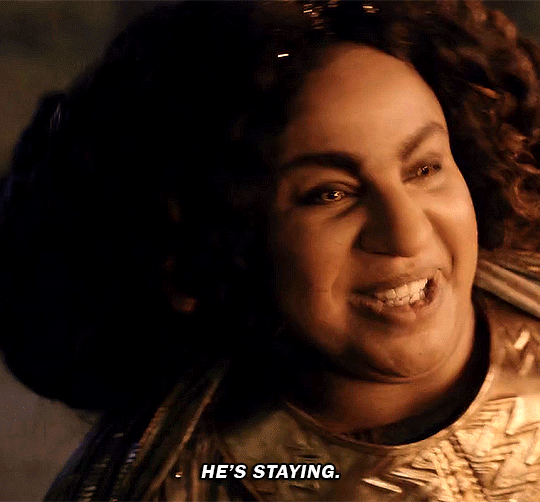
Lady Disa is everything that Dwarves and our Dwarven lovers have deserved and not gotten since time began. On top of being a wonderful character, an equal in all measures to the dense and valourous immovability of dwarven men, but best of all, she has PRESENCE!
Gimli nearly stole the trilogy and it was only Aragorns firm kindness and Legolas's graceful rivalry together that balanced his forceful nature in the movies. I was nervous, because Dwarves are a lot (not in a bad way, but even dwarves must admit, they are a lot) and I worried that any portrayal of dwarven women might be a simply masculine portrayal.
But dear Manwë how wrong I was. Sophia Nomvete's Lady Disa swept the room with her power and brazen audacity and I loved every second of it. The way she cut through Durin's hurt straight to his love by pointing out the Tree, recognizing that while Durin's feelings might be valid, he'd regret it for the rest of his life if he didn't fix it, and treating Elrond with love and kindness despite how badly hurt she knew Durin was, because in the end, no matter how hurt he was, he still cared for that tree.
She balances out the crudity of dwarven men not by being elven proper, but by dwarven keen. Oh, she's clever and reads those around her like the Sunday newspaper. She's steady in the way she presents herself, sturdy in the way she balances out the more ridiculous sides of her husband, and absolutely steadfast in her control of the situation.
She makes me believe that had Dwarven women been in the peace talks between the Elven kingdoms in the first age, they might have had peace sooner, one way or another. Because let's face it, she might have been the absolute picture of kindness and hospitality but she also scared me a little. I would not want to be on her badside.
There were few things in this show that I didn't know I needed, but between the friendship of Durin and Elrond and The great lady just being herself...
And the juxtaposition of Disa and the other great ladies of Middle-earth! Eowyn is mighty and must express it in battle, Galadriel is just so amazing and this post isn't about her so I'll stop there, and Arwen, whose power of choice and grace speaks volumes, but only Disa made me feel at home (and a little scared, the looks she gives are terrifying lol).
And to you Dwarven kind out there saddened by the lack of beard... I hear you, truly. But, tell me it was not amazing seeing a real Dwarven princess be an actual legend on screen? I think the Dwarven legendarium deserves this wonderful woman and just like Elrond's reception by the lady herself, it was such an unexpected joy.

#disa#ramoth13#the rings of power#rop#the lord of the rings#Dwarves#khazad dûm#Moria#jrr tolkien#tolkien lore#tolkien#Aulë#durin iv#durin#sophia nomvete#silmarillion#the unfinished tales#elrond#lord of the rings
628 notes
·
View notes
Text
ramoth13 replied to your post “You can find me here:”
Are you leaving tumblr? I totally get it if you are, I would. But I'll miss your posts!
i’ll stay till it breaks on me, but if this happens i’m not comming back
13 notes
·
View notes
Text
The Orcs and their Enemies:
Characterizations and Dynamics within The Rings of Power
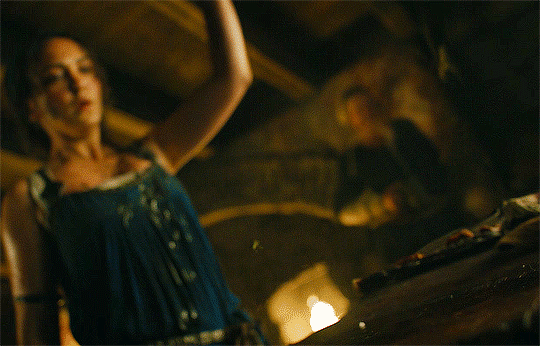
With the introduction of "Adar" the influx of conversation regarding orcs has somehow diminished, rather than expanded. I see this as a huge fault and seek to remedy this immediately.
Orcs serve such an important role in Middle-earth because they are the vehicle by which we understand Morgoth and Sauron's greatest sin. Violence and destruction are obvious and constant, but the truly horrifying aspect of fighting them as enemies, is the knowledge you're fighting your own kind. Its a sick and twisted thing that these once beautiful people were malformed and tortured to become these husks of vile monstrosity. Getting them right is so incredibly important when it comes to Middle-earth adaptations. So I'll begin.
The first thing I noticed about the orcs, was that they were a new kind of terrifying. In Peter Jackson's films, they were scary, but more because of their numbers and their monstrous looks (practical effects are always better in my mind, and Jackson embodied that for me) rather than because of what they were. Jackson's orcs were a kind of infestation, a menace of the likes of violent pests.
These orcs are conniving, vicious, and sinister. But they are also very intelligent. They move like distorted elves and think like clever assassins. These aren't your run of the mill orcs from video games and "good-guys-always-win" trope badguys, that die immediately from a single smack. They have character. And what's more, they mirror everything the elves hate about themselves (in a culturally relevant way, the self-violent kinslaying etc.) and yet somehow remain connected with their former selves, or what they would have been if not for Morgoth's corruption.
Notice that the lesser orcs wear bones and cloth, whereas the leaders wear worn and mismatched Elven armor? And the scene where Adar ends the misery of one of the orc leaders, the orcs then remove the elven armor, obviously prized, and seem to pass it on to whatever the next leader will be. They haven't had access to forges, hiding away, they've become scavengers. Now, only relics of a bygone era, the armor that they do have have been passed down for a long time. I would bet that as the seasons go on, we will see orcs slowly assimilate other armor types into their ranks. And I also bet that the last season we will see forges and new orcish armors. Love that detail.
The second thing I noticed about the orcs made me smile. THEY BURN IN THE SUN. Peter Jackson's Lord of the Rings made mention of this, especially in relation to the Uruk-hai, but did little else with this as the series went on. But the hobbit movies completely ignored this, having full orc chasing dwarves scenes in broad daylight. In Rop however, they are leaning into the beauty of that element.
Morgoth's inverting of all that makes elves, elves, is exactly the kind of legacy that is so important to consider when watching these moments between orcs and elves. That Arondir cries over a tree was just perfection, but that the orcs knew what it meant to those Silvan Elves was amazing. We see Morgoth's inversion of nature further by the light itself. Elves live in light, starlight, moonlight, sunlight. They thrive in it. The silmarills were so coveted not because they were gems, but because they held the light of the trees now long lost (though, one could argue that the sun and the moon are descendants of that light) and yet orcs are not just repelled by such light but burned by it.
The attention to detail regarding the orcs is very cool and fascinating. And of course, if we are speaking of orcs, we must also speak of Adar.
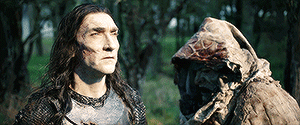
I have said previously that it would only make sense that some elves switched sides. And we have one instance of it seen in the Silm&Hist. What makes him so fascinating is that in his own twisted way, he seems to love his "children" and in a singularly fascinating way, they seem to genuinely respect him. Morgoth and Sauron rule by fear, this is explained again and again. But Adar really does seem like a different thing altogether. He does not seem to hate the elves (at least not so far from what we've seen with Arondir, but that could be because Arondir seems very young for an Elf, much like his "Children") rather they appear to be an impediment to his goals, whatever those are (ascending to god-hood perhaps?).
I've heard mentions of Adar being Maeglin and I think you are supposed to think of Maeglin. I think that is exactly the kind of character they are portraying here, but I don't think it will be an Elf that we know. I think Adar really is a whole new character. But, we'll see.
Finally, so far, every orc we have seen slain has been an incredible achievement. It felt like a real struggle, even for Arondir. These orcs are the orcs that could invade and conquer Gondolin. These orcs could attack swathes of elvendom and cause real chaos.
We will never know what happens to orcs when they Die, but I like to imagine these orcs showing up in the halls of Mandos, reformed into the Elves they should have been, finally in a place where their acceptance isn't reliant on strength or backstabbing. And these orcs are orcs that could become that.
Also, I know this is a orcs appreciation post, but I just wanted to say that I love Bronwyn in this scene and the orc slaying scene. She made it believable to fight a monster and survive, and that's wonderful.
Savo 'lass a lalaith, mellon nín!
~ Ramoth13
#ramoth13#silmarillion#the hobbit#fandom#jrr tolkien#lord of the rings#tolkien#rings of power#lotr orcs#lotr rings of power#the rings of power#rop spoilers#rop#adar#bronwyn#morgoth#Sauron
205 notes
·
View notes
Text
Father of Destiny and the One Who Hears the Voice of the Sea
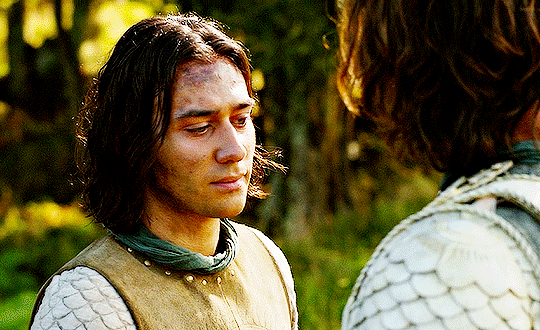
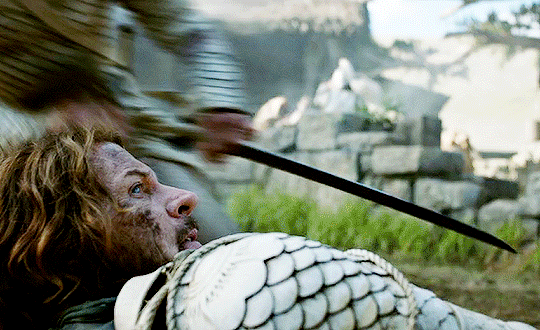
One of the things that I found myself in love with in this show is the depiction of Fatherhood and the relationship between Elendil and Isildur. It would be far too easy to look at this and say it's normal and move on, but in reality it is genuinely anything but normal.
Depictions of the Father/Son relationship in media is nearly always one of either misunderstanding, active rebellion, or violence. Yet, while all three of those elements exist within the narrative involving Elendil and Isildur, the thing we consistently see the most is tenderness, love, and affection. These are almost always exclusively reserved for Father/Daughter portrayals, NOT Father/Son.
Which is important for several reasons, not least of which is because it illustrates a very contrasted distinction between the only other Father/Son dynamic we see in the show (excluding, perhaps, the kind of absent Father relation with Elrond), with Ar-Pharazôn. With him, the dynamic is far more traditional. He's "teaching" his son wisdom because thats the way of things, it's a top down view of fatherhood that makes legacy, rather than individuality, the primary focus.
Legacy is not a bad thing, per se, but when Fatherhood fixates on this (as most traditional modes of masculinity demand of both Father and Son), the inevitable eventuality is that power must be incorporated to keep the dynastic legacy of the father alive. With power comes the need to keep it, and thrive with more of it. We see this even in "positive" depictions of fatherhood, think of all of the movies that portray a father being proud of his son and usually there is always a kind of continued legacy and even extended violence, a Father's dilemma solved by the violence of the son.
With Elendil and Isildur, however, what we get instead is concern for wellbeing and mutual respect, but even more, they actually like each other. This, this is huge. Father's liking their sons, and vice versa, is rare. Respecting each other? All of the time. But actually enjoying the company of the other? It's just an element you rarely see.
Notice how when Elendil is knocked down and Isildurn runs over (seen in the second gif above) what Elendil says isn't "Dont worry about me, keep fighting" which would have been typical and in keeping with the "Dont be weak" mentality. Instead, what we see is Elendil adress Isildur's worry and reassure him that he is okay. It's a small touch, but with huge ramifications. Elendil is acknowledging isildur's feelings without belittling them.
It's a wonderful quality that the creators added, because it could have been so typical without anything being off. Isildur could've been vying to upset and break out of his Father's shadow at every given turn. Elendil could've hated how his son made everything difficult for him in his political life. They could've made the dynamic normal. But instead, chose something genuinely wonderful.
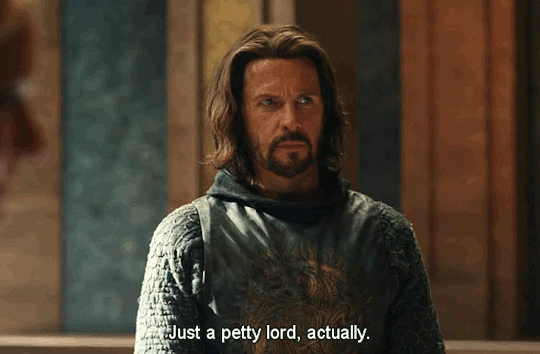
The other element that puts this into a wonderful perspective is Elendil's humility. It's not a faux humility either, as again, we see with Ar-Pharazôn. He is in constant service to others, but without caveat. He quite literally serves others.
By creating a character that loves his children and serves others faithfully, he is simultaneously portraying positive masculinity in a way that allows for violence as a protector but does not glorify that violence as a need, but also exemplifies the allowance and even promotion of emotional maturity. He sobs for his son, he fears for his children, and he worries for his queen, yet also embraces his son, and speaks softly to those he cares for. This, then, is what is seen as keeping the Elven ways alive.
The contrast between Elendil and Ar-Pharazôn is lovely because it is mostly subtle, yet noticeable all the same. One is actively illustrating the wisdom of the Elves and Maia, the other exemplifies the pitfalls of humanity.
Of all of the wonderful things that RoP has done, the relationship between Elendil and Isildur might be the one that moves me the most.
#ramoth13#silmarillion#film#the hobbit#fandom#jrr tolkien#lord of the rings#tolkien#rings of power#rop spoilers#rop#elendil#isildur#ar pharazôn#father/son#father/daughter#masculinity
191 notes
·
View notes
Text
A few thoughts on Galadriel's Valor, Story, and "Girl-boss" energy
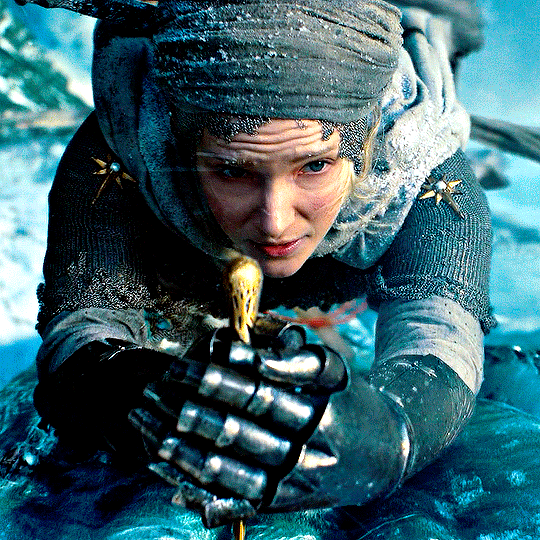
I've seen many things written about the "girl-bossification" of Galadriel, as though she 1. did not need anything extra given to her character, 2. she was diplomatically power hungry rather than vengeful, and 3. she was already Married and had her daughter by the time this show was taking place.
I'm not attempting to defend any creative choices or say why the show is "right" to portray them as they have, but I do think some things could be discussed with a bit more context and I do love some lore-diving and graceful discussions, so here goes.
To the first part (1.), she is recorded as not only engaging in the first kinslaying (she fought AGAINST Feanor, protecting the Teleri, but almost certainly killed other elves and elves aren't known for their weakness), but Tolkien himself said she was a "great warrior" in her youth. In the same vein, canonically she did initially go to Middle-earth to rule, but that is not clearly stated to be false here, merely that she is currently fueled by anger, pride, and vengeance, and rejecting the Valar's pardon which is canon for the most part (pg. 242 Unfinished Tales). Again, not defending, but I do think that this fits into established context as well as the next two points.
2. We're not given a clear reason as to why she, specifically, comes to Middle-earth in the show. There is a general reason why the elves go, yet not her. But I also realize that such logic goes both ways and I also understand that adapted stories are told by admissions AND omissions. However,
3. We know soooo little as to the intentions of the story yet. There's so much left to see, but the one thing I do think is the most important to bring up is the fact that this "character reversal" has been done before, by Peter Jackson and the character of Aragorn.
Aragorn in the books not only knows he's the king, but is downright giddy and excited to get going, reforging Narsil into Anduril before they even leave Rivendell. The rest of the trilogy is him slowly spreading his influence and making his grand "Return" Yet, in the movies it's the exact opposite. Movie Aragorn is not just reluctant, but almost hostile to the mere idea of reclaiming his throne, and slowly throughout the series he is pushed towards that reclamation of power.
In the RoP, we see Alatáriel/Artanis (Galadriel) as the daughter of a great Noldorin lord, single and alone in a quest for vengeance. Yet, we know she will become the most influential Elf in all of Middle-earth. The reason she doesn't fit that bill yet is because THAT is the story that I think they are telling. Literally the first episode is setting up the journey towards finally letting go of the sword, claiming the influential (but non-martial) power of her birthright and marrying (quite scandalously, I might add) a sindar elf that will unite the Noldorin and Sindarin Elves into a United people.
I think the story we are going to see is Alatáriel, the sword-wielding daughter of Arafinwë, become the Galadriel, Queen of the Elves of Middle-earth.
(*POSSIBLE SPOILERS FOR SHOW-ONLY WATCHERS*)
After all, when Sauron/Annatar does return and sway the Elven people, there are only two elves that find him untrustworthy and reject him (Galadriel and Elrond).... and the fact that no one listens to her has always been questionable and unexplained in the cannon narrative. If the most powerful and influential leader alive said someone seems sketchy and shouldn't be trusted, it doesn't make sense that you'd ignore those warnings off-hand, especially if she was regarded as one of the wisest elves alive.
But if it's a blood thirsty, vengeful war-leader who has spurned the commands of her king who is saying that this beautiful and gracious elf who has been kind and generous and infinitely helpful to all of her people is actually evil incarnate, perhaps she would not be given much credence and would instead be ignored. It might actually HELP explain a few things lol.
(*POSSIBLE SPOILERS CONCLUDED*)
In the end, we will simply have to wait and see. But I think she's (Morfydd Clark) bringing something to Galadriel we have never seen but always known about, and that's a personal history. Just like Aragorn, I'd bet my last penny that we will see the Galadriel we all know and love, but that's the journey she is on. And I am so excited to see it happen!
But perhaps I'm like Elrond and harbour naive hope for the future, only time (or perhaps a certain Elf's magical mirror) will tell.
In any case, I wish you all well!
Na lû e-govaded 'wîn, mellon nin!
~ Ramoth13
#ramoth13#fandom#lord of the rings#silmarillion#the hobbit#rings of power#galadriel#jrr tolkien#tolkien elves#tolkien#histories of Middle-earth#tolkien lore#morfydd clark#noldor elves#Noldorin#Sindarin#sindar elves#the rings of power
225 notes
·
View notes
Text
One of Tolkien's Greatest Tragedies made Right

In all of Tolkien's works, we only ever get three female Hobbits that are in any way described in detail. Lobelia Sackville-Baggins, Belladonna Took Baggins, and Rosie Cotton (Gamgee).
One is an insidious relative and the only woman in the entirety of The Hobbit book. The second is only ever mentioned. The last is barely mentioned beyond Samwise's desire to get home. Tolkien's list of women has never been robust, but the women of the shire are practically non-existent beyond annoying relatives, mothers, and "back home" crushes. The women of Tolkien have always suffered under careful eye. While yes, Tolkien's women are nearly always incredibly powerful, beautiful, strong, and resilient, they are quite literally the exceptional women. We never see the female portrayed in the mundane. Arwen is almost entirely portrayed within an appendice, and Melian, Galadriel, and Varda/Elbereth, while described as groundbases of influence, intimidation, and power, are rarely seen in an active way. Yet, if human, Maiar, and Elven ladies have been under-represented, Dwarven women and Hobbit women have been all but entirely omitted.
My admiration and love of the professor's works are endless and boundless, but this is, indeed, an incredible tragedy.... that has finally been remedied!
Elanora "Nori" Brandyfoot and Poppy Proudfellow are like music to my ears. Yes! Show me the little hobbit ladies running through the meadows, let's see these little women shape a big earth. I want it all.
(For those waiting to discuss the utter perfection that is Lady Disa, she obviously deserves her own post which I will remedy tomorrow).
With that said, I'm excited to see how Hobbit culture is portrayed beyond the realm of the shire. We know that migratory Hobbits existed, but its interesting to see them move as a tactic of avoidance, rather than trade. Hiding away as a means of protection, never staying too long to avoid discovery. Being shy of traders also makes this absolutely necessary as their only means of survival is traveling to a new area that will allow for hunting and foraging, rather than farming or trading.
I've seen much said about their humor, but it felt good and genuine. It's also nice to see that mistrust of strangers wasn't a strictly a 3rd age problem.
I'd love to see how the Harfoots begin to set down roots, create and facilitate trade between other Hobbits and hopefully see more adventurous cottage-girl hobbits. The idea that Nori Brandyfoot, or at least her kin, might somehow down the line be connected with Sadoc Brandybuck? If that is the implication, it would be a very fun Easter egg, indeed.
I'm stoked to see how these ladies interact with whatever Maiar they've found and inherited, be it Gandalf, Balrog, or Bombadil himself. I'm excited for these little hobbit girls to see the world they've always hidden from, and it is about time too.
~ Ramoth13
#ramoth13#fandom#movies#silmarillion#the hobbit#amazon#lord of the rings#the rings of power#rop#nori brandyfoot#hobbits#harfoots#the shire#the second age#baggins#jrr tolkien#tolkien lore#tolkien#halflings#markella kavenagh#megan richards#poppy proudfellow
210 notes
·
View notes
Text
A Token Returned: Elrond's Oath
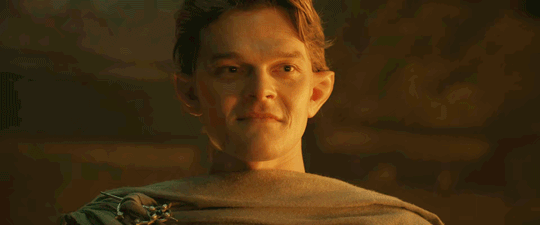
This scene.... this scene broke me. Understanding that Elrond's great, great Grandfather also made an oath of brotherhood and friendship which caused the many, many deaths of the Noldor and brought them to Middle-earth. Knowing, that an oath like this was what caused the horrible atrocities of the kinslayings. He's so young, this elf. How could he know?
When Fingolfin (Nolofinwe) made an oath to his half brother, Fëanor, an oath that cost him his family and eventually his life, what that oath entailed was suffering. He promised shared suffering, that his people (Fingolfin's) would also share the suffering of his Half-brother's. In the end, Fëanor used that oath against Fingolfin and caused countless deaths during the crossing of the Helcaraxe and then many more as they fought Morgoth and Sauron, but it was that one moment, that one oath that put Fingolfin's family on this path.
And more... it was this same oath that saw all of Elrond's family fled or killed. So much death, and grief, and pain for an oath.
Oaths are a bain, in Tolkien's world. An oath is always tricky, beautiful, and dooming. Anytime there is an oath made, beware, for that oath will be tested and tried every way imaginable by its end. In this, Elrond and Celebrimbor share much, for Celebrimbor's grandfather made an oath that killed every descendant but one, and he has yet to be tested by it I think.
Yet, I hope that Durin is made of better things than the one of Flame, Fëanor. I hope Elrond's journey to becoming Ruler of Imladris is full of friendship and camaraderie.
I have hope...
~ Ramoth13
#ramoth13#silmarillion#the hobbit#rings of power#tolkien#lord of the rings#jrr tolkien#fandom#rop#the rings of power#elrond#noldor elves#noldor#fëanor#fingolfin#celebrimbor#durin iv#dwarves
168 notes
·
View notes
Text
Elrond's Youth

One of the things that I find most interesting so far is how we see this incredibly young (half)elf that's obviously full of hope and positivity in the future, juxtaposed with someone who knows how bad things can really get (Galadriel). Elrond hasn't witnessed the countless slaughters of his kin people, the fall of nearly every Elven kingdom made (Valinor being the exception, but he hasn't seen that either). He hasn't had to witness the the many kings of Fingolfin's/Nolofinwe's line die gruesome deaths.
Not to say he knows nothing of death, obviously his brother and Durin IV seem to ring a similar bell, and of course he probably witnessed the slaying of his own clan by other Elves (or was at least present) but I think its fascinating to see an Elf on screen that is genuinely hopeful for the future, a bit naive that things are finally going to be okay.
Elrond's approach to Khazad-dûm shows just how optimistic he is that everything and everyone will finally be okay, made better. I often think about the Elves of the first and second ages as being in the midst of despair, and then in the third age accepting the nature of things. Yet, its interesting to see the youngest elf ever shown on screen as being hopeful for the future. It makes sense why Gil-galad has him so close, someone who sees a brighter future, when most other elves are jaded and worn by countless wars and tragedies. They didn't mention the Helcaraxe crossing during the flight to Middle-Earth (for those just watching the show, the trip to Middle-earth was significantly more horrible, filled with betrayal and needless deaths) but anyone who had experienced that would not look upon middle-earth with fondness, let alone hope. Yet, that's Elrond's role in the Elven kingdom, hope for the future, for Elvendom and the Noldorin people.
I'm not sure I like anything in this show as much as I am enjoying the way that Robert Aramayo is portraying such a pivotal character. Plus, his friendship with Durin really is just great. You can tell that when they are in the midst of the competition, he could keep going and probably humiliate his friend in front of his people to get what he wants, but the subtle way you see him calculate the results and weighs his choices before he sets the hammer down was a really great touch.
So wise and thoughtful, just like Elrond, one day ruler of Imladris, would be. I love it.
~ Ramoth13
#ramoth13#fandom#lord of the rings#silmarillion#the hobbit#Elrond#valinor#Lindon#imladris#rivendell#rings of power#rop#durin iv#Galadriel#noldor elves#noldor#second age#helcaraxe#first kinslaying#middle earth#numenor#jrr tolkien#tolkien elves#tolkien#robert aramayo
234 notes
·
View notes
Text
Elven Lineage and the Fate of the Last Noldorin Royalty
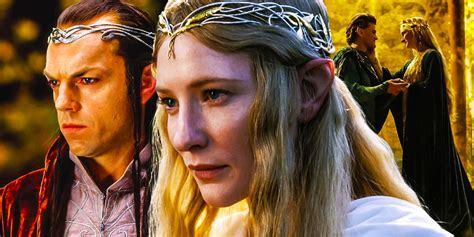
Mae G'ovannen!
I am once again brought back to these lands of old, beyond memory. Middle-earth and the Noldor kings and queen (as if they are ever far from my mind).
Rewatching the Rings of Power (again), I am struck by the beauty of the friendship between Elrond and Galadriel. Watching episode 1 again, I see their friendship in the shadow of the ring.
Elrond so compassionate, hopeful, and kind. His undying friendship is what I believe makes him such a compelling character throughout all of their stories, but also his will to be unchanged by woes of the every day. The way that elrond approaches the ring of power is in such a way that he need not even reject it, for its power has no appeal upon him. Even when it is fully within his realm, we never even question that he sends the fellowship on their way without fuss. Elrond is always pulling out the best and most righteous in people, even those who are not always deserving.
In Imladris, the valley Rivendell, Elrond rules not in defiance, but without regard of the shadow. His is a peaceful place, a home. A perfect calm in the storm.
In contrast, Galadriel must prove that she CAN reject the ring, in order to return home to Valinor. She is passionate, powerful, and cunning. Her powers balance out the force and cruelty of the orcs. In her realm, though life grows, it grows in defiance. The elder trees no longer bloom in Middle-earth, except for Lothlórian. Her powers are in defiance to the shadow.
And in this, they are in balance.

Yet, I saw something in them that I had not before this viewing. They are a rekindling of friendship of a different kind. They unite, and do not seek the pain and suffering of their forebears. They have evaded the trap that the first elven lords fell into.
Notice, that although Elrond has the greater claim to rule the Noldor, he does not? Never had I really considered this, but it was Fingolfin's line that was upon the throne. And yet, when the time came, it was Galadriel that took the throne in Middle-earth. Now, it makes sense, because she is the eldest of the Eldar in Middle-earth, and one of very few who still remembers the light of the twin trees.
Still, it does make one wonder.
Why was there no conflict?
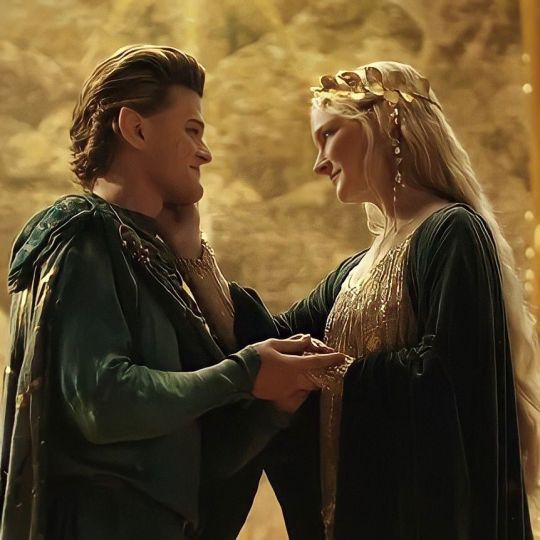

(Art by Jenny Dolfen)
In times past, when last the elven lords of old disputed the rule, there was endless conflict that burned the whole of the world. But between Galadriel and Elrond, only friendship. And hard won friendship, at that.
In this light, seeing them navigate the pitfalls of their ancestors really does invite a new perspective that I have thoroughly enjoyed on the rewatch. And I cannot help but look forward to what comes next in their story as friends.
Not to mention how Gandalf gets his name among the Elves.

Just some thoughts for you RoP fans out there.
In any case, I wish you all well!!
Galu!
~ Ramoth13
#ramoth13#silmarillion#film#the hobbit#fandom#rings of power#lord of the rings#elrond rop#galadriel#elrond#fingolfin#feanor#amazon lotr#lotr rings of power#rings of power season 2#rop season 2
24 notes
·
View notes
Text
Contrasts in Live-Action Adaptions:
Jackson's Legacy and Those That Come After

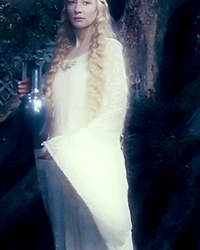
Mae g'ovannen!
As time has progressed, we are well into the new series and I have yet to see a proper examination of these adaptations that discusses how they have approached the source material (outside of using either as an excuse to justify why you should or should not hate the other).
So with that said, I shall refrain from comparing them in terms of "faithfulness" or "accuracy" and instead look at what changes were made and how they compare to the stories we know. Before we begin, it is fair to point out that six movies, while extensive, simply cannot maintain the weight of story that a TV show provides. Nor can a TV show be as concise and move as quickly as a film/series. Though these comparisons are interesting, we should remember that these really are in two related, but separate, genres.
I have mentioned in another post that the orcs are truly different for many reasons, not least of which because we can actually take the time to get to know them. This is all at once, beautiful to see, terrifying to witness, and disheartening to understand. But since I have already dedicated a post to the differences between Jackson's vision and those of McKay and Payne's regarding orcs, I will move on. Suffice to say, it is fascinating to see more of orcish culture.
People tend to focus on the differences between Jackson and M&P, but I would also like to point out their similarities. First of which is the portrayal of Elven femininity.
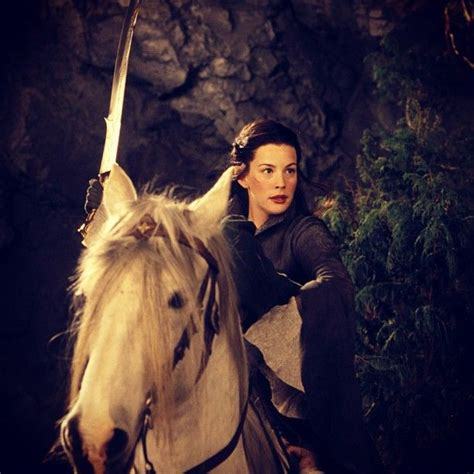

Contrary to popular belief, it was Jackson's depiction of Arwen (the all but non-existent character in the books whose entire story was relegated to an appendix in RotK) that first popularized the sword weilding elf-maiden visual that challenged the concept of elvish passivity (at least in terms of female elves) which has had a lovely, albeit confusing effect upon viewers. It is interesting that while M&P's version of this trope featuring Galadriel is the only canon example of this (other posts go into more detail but Galadriel was canonically not only a great warrior and athlete but in many versions fights and slays Elves), theirs is the most critiqued. But in any case, this "new" trend of elven warrior maidens started (though a few others had done it first, none had popularized it to the same degree) by Jackson has become an endearing element across genre's and Elvish portrayals.
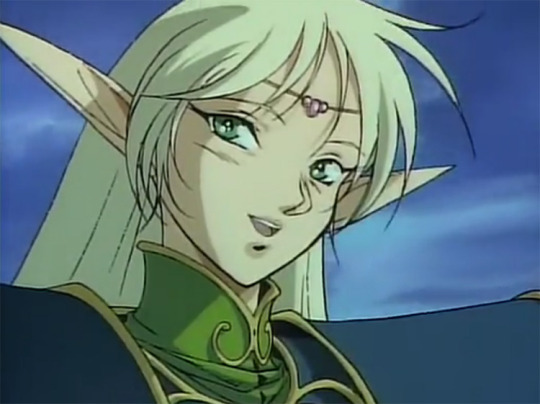
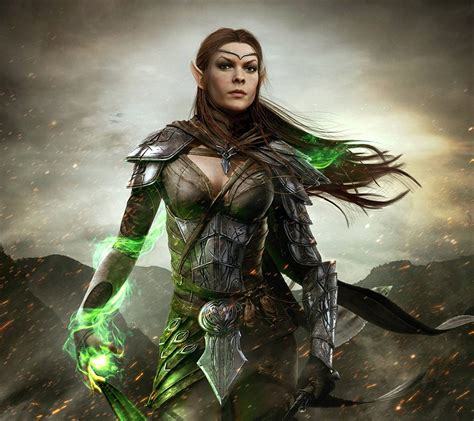

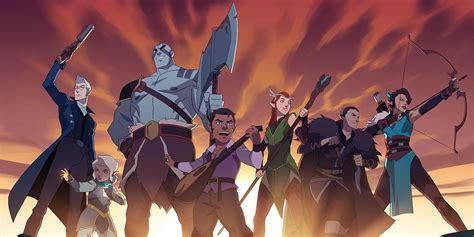
(Note on the picture choices: finding a picture of Vex from the Vox Machina show proved absurdly difficult for some reason which I cannot fathom, and the anime shown is older than Jackson's movies, but is a good illustration of female elves as passive magical powers as opposed to modern takes of physical prowess)
The female Elvish warrior is a staple in the fantasy genre, and while elvish maidens have often been central to conflict, they were, until Jackson's bold replacement of Glorfindel with Arwen, primarily reserved as magic users in battle. The interesting factor here is how these portrayals have been reintegrated into fantasy as a trope. I'm not complaining in the least. I honestly quite like it, but none the less, his legacy in this has had far reaching effects.
Another fascinating comparison to consider is the display of Elves, and here I do not mean the changes in hair length or the use of models (Jackson) as opposed to actors (M&P). Rather, their emotions. One of the reasons I believe that so many movie viewers have had such a hard time with the show is that the elves express far more emotion than in the movies. In the books, elves swing from trees, sing la-di-da songs, and annoy Gandalf to no end, to say nothing of the furious and murderous rages of the Feanorians or the countless acts of jealousy, pettiness, and cruelty. Yet, with the singular example of Thranduil in the Hobbit trilogy, Jackson's elves are almost always stoic. Some might even say, uncaring or disinterested.
M&Ps elves are far more given to emotion, displaying all of the elven pride and arrogance that we have come to associate with the Elves of the first and second age in the books. Even still, no adaptation has come close to the vine-swinging, Gandalf annoying, la-di-do singing Elves of the Hobbit. This is not shocking of course, imagine how well people would take any adaptation when some of fiercest warriors around were dancing around and singing like children. No matter how beautiful the palace, such elves would be seen as absurd by the average viewer.
Which brings another point up about these adaptations, the architecture. Notice that there are subtle differences in the vast displays of Khazad-dûm and Elvendom as a whole, but for the most part, they both utilized the same art designs that Jackson did to evoke the same awe and wonder. Yet, for Numenor, they went full on grecian/roman. I am not upset by this, but it does a lovely job of illustrating the changes in time. Jackson's Gondorian soldiers/architecture had elements of ancient Greece (think of the marble statues in Gondor's throne room) but for the most part it was very medieval and byzantine.
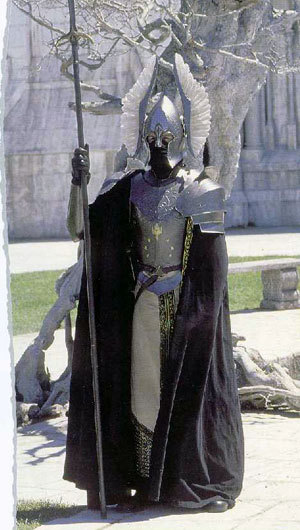
Armor was worn underneath draped cloaks to display sigils or else they were simply fully plated. Yet in M&Ps Numenor, they wear robes and the armor is worn in full display over the clothes, wearing armors in more of a Greco/Roman inspired look.
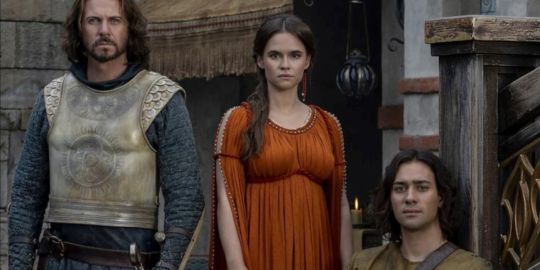
These are minor changes, but fit the narrative of illustrating the shifting of time and I think work very well to show two related but distant societies.
Shifting again, I briefly mentioned this before but I feel it is so incredibly cool not to bring up and make a big deal about, but notice that the Harfoots have a tradition of naming their fallen? On the outside, this makes sense. Memorizing those that were lost or left behind would only be natural, especially as a nomadic peoples. They obviously keep records of who was lost and when. But this leads into something for more meaningful when you consider that these records of people lost, are also acting as geneologies. The records of the fallen, which are sacred texts, become the very same important documents by which hobbits keep track of their family. What started off as a way to pay respect to the dead, in the show, is exactly the element of Hobbit culture that all Hobbits obsess over, including Bilbo. In portraying Harfoots as they have, M&Ps adaptations have set the stage for Jackson's Hobbits, which is just such a clever little thing.
A final little thing I've noticed is in regards to the weapons. In Jackson's films, all elven weapons are curved and one sided with the exception of one, Glamdring, which is wielded by Gandalf. Glamdring was King Turgon's personal sword in the first age. When I first saw RoP, I was shocked to see so many cross-guards on the Elvish swords, expecting the Jackson look to be continued. Yet, interestingly, we see Númenorians wield curved swords. I love this little change, and were I to comment upon it I might wonder if this was an intentional hint as to the mingling of the last alliance. Perhaps, in M&Ps story, as elves and humans reintegrate into a society together, their weapons reflect those changes of perspective. Elves come to appreciate human ingenuity and rework the design to facilitate more graceful and fluidic slashes, and humans relearn the wisdom of ageless elven forging techniques, making swords that were more sturdy and powerful. Whatever the answer is, it was a fascinating choice (I would have added pictures to illustrate, but there is a 10 picture limit).
I might make a further comparison once the season ends, til then I wish you blessed day in the descended lights of the great trees.
Êl síla erin lû e-govaded 'wîn.
~ Ramoth13
#ramoth13#silmarillion#film#the hobbit#fandom#jrr tolkien#lord of the rings#tolkien#rings of power#peter jackson#McKay and Payne#lotr orcs#dwarves#sindar elves#noldor elves#tolkien elves#silvan elves#harfoots#hobbits#gondor#numenor#arwen evenstar#galadriel#sauron#histories of middle earth#middle earth#arda#glamdring#gandalf
76 notes
·
View notes
Text
A few thoughts on Arondir, the most Elven... and I have Questions
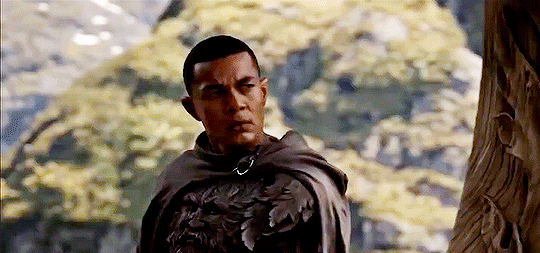
My greatest fear when I realized the show was being made was the original characters. Are they going to overshadow the canon characters? Are they going to replace them? How will it look?
Well, Arondir fixed that fear very quickly for me. He's perfect! Keen, graceful, and light-stepped, he is exactly what an elf in an age of war would be. I love that he is caring (we see this in the way he doesn't give up the humans when he suspects something bad) and careful and wary. I'm so excited to see him just let loose. Show me the crazy arrow acrobatics, shield sliding, snow walking, orc slaying awesomeness.
And of course, let us not forget his relationship with a human, Bronwyn. In all of Tolkien we see three relationships between humans and Elves (unless you include Earendil, which I've heard arguments both ways, but that's not a can of worms I intend to open) and in every case, it was a Male human and a female elf. This, is utterly new.
This is good. I love this. It's so cool! We've never seen this dynamic in Tolkien's world. The longing, the way he doesn't fit with the other Elve's mindset. Its just so much fun. I can't wait to see how Arondir and Bronwyn develop as characters. The yearning is on point for me.
Now to my questions.... what kind of Elf is he? Is he Silvan? Sindarin? Noldorin? My first thought would be Silvan, as the bark-like armor is reminiscent of what might one day become the forest of Mirkwood. My dearest hope is that he is Sindarin (let's get some flashbacks of Doriath!!! Please show me Elu Thingol and Melian). But they haven't really made any distinction yet between the Sindar and the Noldor, let alone the other various branches.
If he is Noldorin, is he Calaquendi also? And of which house? How old is he? Did he fight the humans that worshiped Morgoth? Did he witness any of the Kinslayings? I need to know.
I'm seeing a lot saying he is Silvan (like Tauriel from the Hobbit, for those only watching the show/movies) as opposed to Sindarin (like Legolas and Thranduil) which is what I supposed based only on his armor, but still. I'd love to hear someone discuss it.
There's so much left to see! Of all of the character arcs I'm most excited to explore, I think Arondir's will take us into the places I most want to see (aside from Numenor).
I look forward to seeing this elf break-bad and get his human gal. Besides, don't we all dream of an Elven lover sweeping us off of our feet? (To you Dwarf lovers, I respectfully note your quick rejection lol)
Galu, mhellyn!
~ Ramoth13
#ramoth13#lotr rings of power#the rings of power#Arondir#rop#fandom#the lord of the rings#silmarillion#jrr tolkien#tolkien lore#tolkien elves#sindar elves#noldor elves#silvan elves#Lindon#valinor#the hobbit#fan theory#ismael cruz córdova
76 notes
·
View notes
Text
Top Ten Standalone Films
(I've done these as individuals on here already and thought I might put them all together)
1. Master and Commander
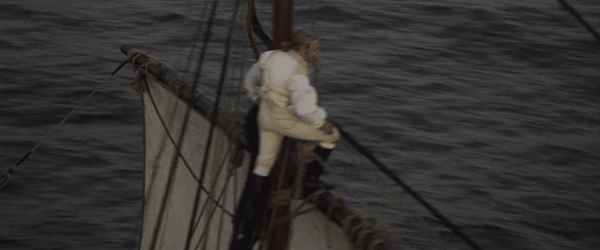
This is it. The best one. Historically, thematically, emotionally... this movie tells a story about a captain, a doctor, and the crew of a ship very far from home. Adventure and glory, sorrow and heartache, the beautiful scenery is perfectly juxtaposed with the intensity of naval warfare happening on the other side of the world. The characters are compelling and the drama feels real. I have not found a better film to watch yet. This movie has more than one Surprise waiting for you.
2. In Bruges
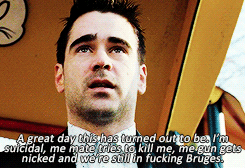
The funniest, saddest, most relatable and unrelatable movie I have ever seen. Excellent movie dialogue that will have you quoting it for months, gorgeous views, sex, guns, and rock & roll. This movie delves into depression without leaving us too heavy and asks if we are worth redemption. I don't know the answer, but I love the way this movie asks that question.
3. The Rum Diary
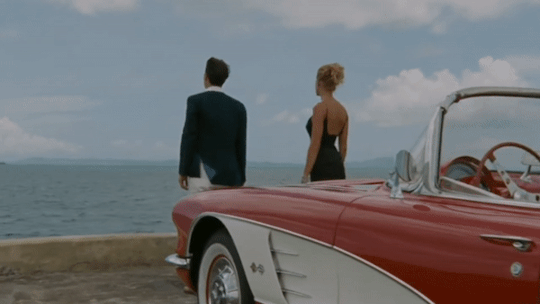
This recommendation seems a bit in bad taste considering the recent circumstances (the very high profile, publicly volatile divorce of the two movie leads), but don't let that detract from the ambiance, camaraderie, and humor this film produces. Based on the Book by Hunter S. Thompson, this movie is funny, intriguing, and more than a little revealing. No matter what paradise you live in, there's always a dark side, and sometimes the good guys just don't win. But that doesn't mean you can't enjoy the memories of friends, lovers, and the good times.
4. Cast Away
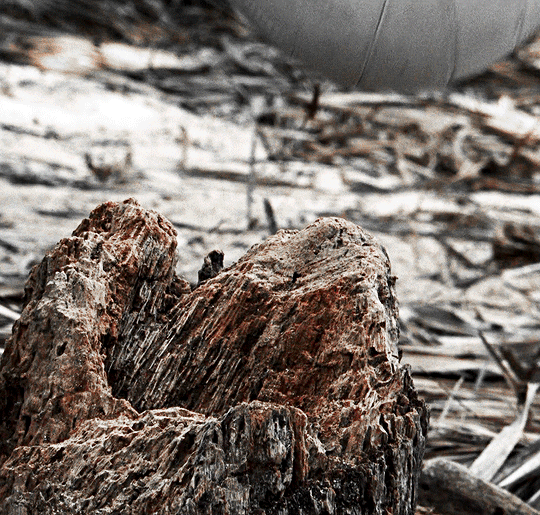
Never in my life have I felt loss like I did the first time I watched this movie. But neither have I ever felt such hope. The ups, the downs, everything in between. This movie made me believe in myself and in humanity. I can't say much more than this, if you haven't seen it, I cannot recommend it enough. Though, much like Brad Pitt (in a different movie), I can't stop asking myself "What's in the box?"
5. Wake of the Red Witch
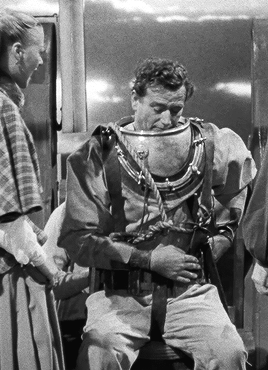
Sailing, thieving, sunken ships, love stories, and giant squids. I love this movie. An old John Wayne film that isn't a western or a war film, this movie stands outside of most at the time. The story is old (and sometimes suffers from antiquated prejudices and morals), but this movie speaks of loves lost and new and the things we do for the memories we carry.
6. Midnight in Paris

A film by Woody Allen, this film is magical and timeless. I think as a writer it's very easy to mythologize prior authors as being greats. Most writers I know do have an appreciation for old things. Yet, while this movie does glorify the past, it makes certain to recognize that there is no real golden age. I love the story, the acting, and the vibes this movie gives off, but more than anything else, I love the message. People before you will always be better at whatever it is you are doing, but that doesn't mean you shouldn't do it anyway. Who knows? Maybe you'll be the next Neil Gaiman or Stephen King.
7. Darjeeling Limited

Having two brothers, this Wes Anderson film was me. It hit every aspect of being a brother and having brothers that feels important. It also is just a fun story. Religion, truth, soul searching, and the complexities of being a family, this film highlights the fact that being a family isn't always easy and that just because you love someone does not mean that you like them. I cannot tell you how much this movie affected me and how much watching it improved my relationships. It sounds corny, but for me at least, its true. Family is tough, but sometimes its easy too.
8. 1408

1408 is not new. It isn't ultra scary or particularly novel (haunted place that traps you inside). Yet, what makes this film so great to me is that it does 3 unique things. First, it speaks to me as the skeptic. I don't believe in the boogeyman or ghosts or spirits, but this movie acknowledges my skepticism and yet doesn't try to convince me otherwise. It places you inside of the least scary place I can think of, a heavily populated building in the middle of New York city. It doesn't ask whether you believe because it just doesn't care. Second, it tells a real story. Not like a story that actually happened, but a story with a real person at the heart of it. Real emotions, and consequences. Third, it haunts me. I saw this movie when it first came out and I still think about it. I don't believe in ghosts and while this movie did not make me believe otherwise, it did something far more meaningful. It made me- even if only for a moment, doubt.
9. The Princess Bride
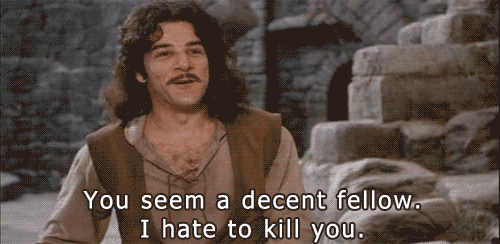
What to say about this film? It needs no introduction. Adventure, comedy, romance, swordfighting, and shrieking eels, this movie has it all. This film has had me laughing, crying, and quoting lines from its impeccable dialogue since I was a child. The writing, acting, and swordplay makes this film iconic in nearly every way. There are very few movies that I could watch a hundred times and still be willing to watch again, but if someone asked me to watch it right here and now? It is inconceivable that I'd reply with anything other than "as you wish"
10. The Man in the Hat

This movie was the most relaxing, endearing, and beautiful takes on grief and our relationship with it that I have ever seen. Ciaran Hinds is always a wonderful actor, but this has to be my favorite of his (Persuasion is a close second). The soundtrack was charming and makes this traveling adventure something unforgettable. The lack of dialogue makes the film more (not less) approachable and the delightful way in which grief is neither praised nor vilified allows the story to gently pull us along without fuss. Whether the french countryside or the human capacity to explore our inner emotions, The Man in the Hat ensures a journey that you'll remember.
~ ~ ~ ~
Stewart Z (AKA Ramoth13)'s Recommendations
#ramoth13#film#top ten#movie#movies#fandom#master and commander#aubreyad#in bruges#cast away#the rum diary#the darjeeling limited#wake of the red witch#midnight in paris#1408#the princess bride#the man in the hat#all these movies have issues#but these were the ones that spoke to me
132 notes
·
View notes
Text
D&D and the Devil:
A Short Essay for Fantasy Lovers and TTRPG Enthusiasts
(Like me)
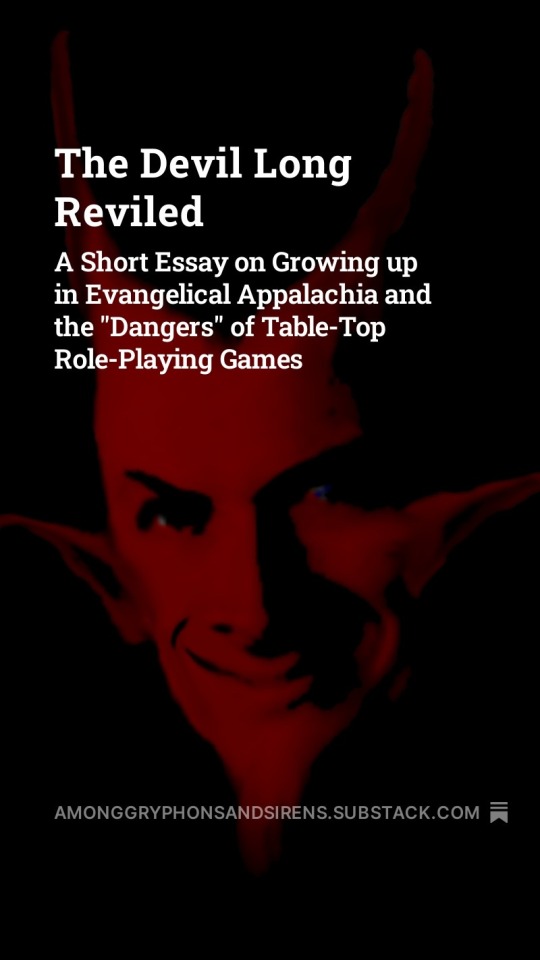
Enjoy!
~ Ramoth13
#ramoth13#fantasy#d&d#ttrpg#ttrpg community#appalachia#evangelicals#christianity#the devil#magic#religion#philosophy#essay#dungeons and dragons#dungeons & dragons#critical role#dimension 20#satanic panic#bible belt#jrr tolkien
3 notes
·
View notes
Text
A Thought on a Grand Opening

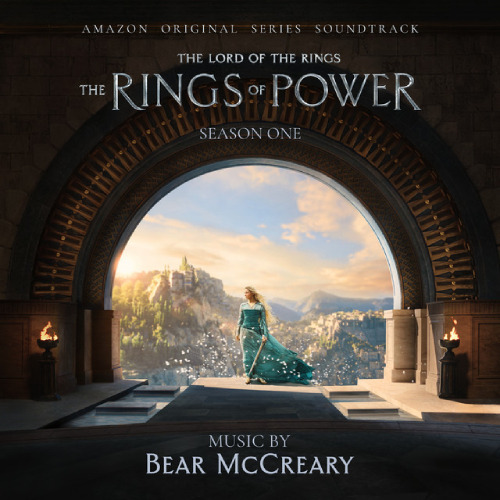
I was listening to the Tolkien Professor (Dr. Cory Olsen) and he mentioned the opening and the shifting as if they were moved by resonance and suddenly I realized that the opening (by guest composer and Lord of the Rings Veteren, Howard Shore) reminded me of something far older than anything else we've ever heard or even heard spoken of in Middle-earth.
If you listen closely, you might hear something very familiar. First you hear strings and gorgeous vocals for the first movement, and then there's a racket of drums and a darkening before its returned to the original theme, but slightly more somber....
If you don't recognize what I just described, you may wish to go back to the Silmarillion and read about the creation of Arda, because the opening is Eru's song of creation. The resonance of creation, the movement of parts, and the addition of Melkor's drumming racket, it's the way that the world was made. Howard Shore literally starts the show off with the making of the world.
Now, this is to say nothing about Bear Mcreary's beautiful soundtrack which I could talk about forever, too. But the fact that Shore could make that piece and show us parts of the Silmarillion without actually needing the rights was just clever and, again, gorgeously done.
Say whatever you want about anything you want, but the music is about as objectively as beautiful and moving as you can get. I've listened to "Númenor" at least 1,000 times.
Listen to the beauty of the Ainur, the Elves, Dwarves, Hobbits, and Humans. Hear their stories. Their resonance will affect us all.
~ Ramoth13
#ramoth13#fandom#silmarillion#lord of the rings#the hobbit#tolkien#jrr tolkien#music#howard shore#bear mccreary#eru iluvatar#music of the ainur#lotr rings of power#the rings of power#rings of power#the lord of the rings#rop
63 notes
·
View notes
Text
Touching the Ancient: Fact and Fiction

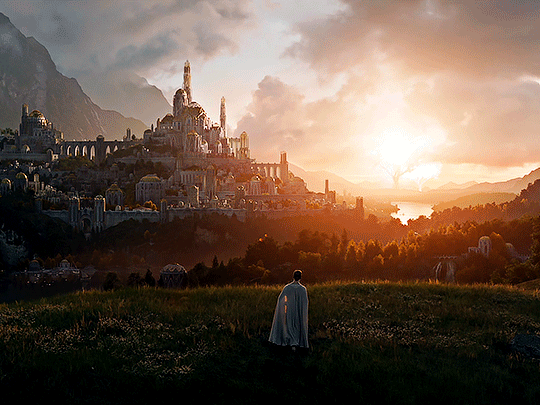
There exists a fascination within our fictions with the idea of the ancient and our proximity to it. Whether it's sprawling archeological adventures, vast forgotten cities, or the writings of those long past, the ancient begs to be heard in the ruins of our ancestors, be it stone or page. The ancient compells us, transforms us, and inspires us forward. Nowhere does the ancient affect us more than in fantasy, that genre where the ancient need not be present at all, yet has more prevalence and dominion than in almost any other genre.
But where does that stem from?
It is hard to imagine such ancient fascination originating anywhere outside of the Mythology of our religions.
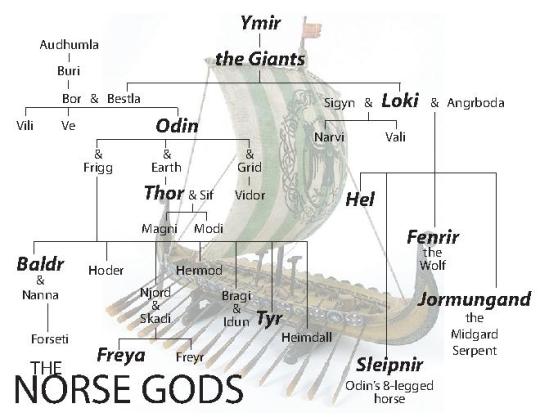
Mythology is the ancient that is still (in so far as it pertains to religion) relevant. Here, I used Norse Mythology, because of its relation to stories such as Beowulf and Medievalism, but take your pick. Hinduism, Buddhism, Judaism, Zorastrianism, Greek, and/or Egyptian mythologies all create a narrative that explains why the ancient is immediately relevant. Fantasy, it can and has been said, is a direct descendant of Mythology, extending back to the kinds of myths that are now staples of literature, like the Epic of Gilgamesh or even The Odyssey.
But something happens in the 19th century that changes the layout of ancient history. After Napoleon Bonaparte set out to claim the ancient world for himself, essentially creating the idea of the Meuseum, we set off on a path to reclaim our origins. We start trying to go back, to pinpoint the earliest stages of our existence. Science has become the dominant source of knowledge, and historians and archeologists have become more than just academics, but conduits to a lost world. Thus, it was only natural that during this period, where fact and myth were endlessly enmeshed, that stories began to emerge that radically shifted what "ancient" even was.

Pulp fiction was certainly not the first foray into the ancient, but it was one of the earlier elements that capitalized on our newfound obsession with discovering the ancient. Conan the Barbarian leapt off of the page because his stories doubled down on ancient, marrying our consideration of what was ancient to an even earlier ancient filled with eldritch monsters and secrets best left buried.
"Know, O Prince, that between the years when the oceans drank Atlantis and the gleaming cities, and the years of the rise of the Sons of Aryas, there was an Age undreamed of, when shining kingdoms lay spread across the world like blue mantles beneath the stars - (...) Hither came Conan, the Cimmerian, black-haired, sullen-eyed, sword in hand, a thief, a reaver, a slayer, with gigantic melancholies and gigantic mirth, to tread the jeweled thrones of the Earth under his sandaled feet."
Conan's age before written histories was an endless opportunity to tell the human story with all of magics of our myths but without the confines of conflicting dogma. Lovecraft's tales invoked fear and the utter unimportance of humanity in the face of the ancient cosmos, while Edgar Rice Burrough's tales sang of a new dominance over the ancient by the modern man in Tarzan and John Carter. The early 1900s were a breeding ground for the kinds of stories that would later inspire the masses.
Now there is a taste for the weird and a desire for the old. Enter, Tolkien.

(You didn't really think I'd go an entire short essay without bringing him up, did you?)
A linguist with a fascination of mythology and weird stories, the dear professor decides to enter the game. He wants to write his own history of our world before the dawn of recorded histories, but he's got his own ideas on how detailed he wants to be.
Rather than merely creating another history, Tolkien's mythology instead seeks to tap into the ancient by recreating the historical hurdles that historians face. The books we get are (according to Tolkien, *wink * *wink*) translations of copies of copies of retellings and secondhand accounts with lots of missing data.
"Tolkien used the language of the historians to create fabricated history with all of its flaws. This sets up a world where the past is immediately relevant, something Tolkien desperately wanted" (I'm paraphrasing Sherrylyn Branchaw here).
The world of Middle-earth is ancient for us, but contains the ancient within. The Elves have risen, and fallen. Morgoth's legacy remains, but his person is gone. Gondolin, the twin trees, Numenor, all ancient and almost forgotten in the time of Bilbo and Frodo.
The fantasy genre as a whole is subjected to the ancient as a trope after this. From the Howard-esque sword and sorcerous world of Michael Moorecock's Elric of Melnibone, to the endless stories of myth and magic, the ancient is the obsession of the "nerdy" even unto genres you wouldn't expect. So many superheroes get their powers from ancient beings (Shazam, Dr. Fate, Thor himself, etc) and even in the most iconic space operas....

Its a part of Star Wars that people often forget, but the where of this story is just as important as the when. It's the starting point, before all else, it has to tell you that this story is distant from us, but also ancient to us. And somehow that makes it just a slight bit more compelling.
Though the colonialism that is embedded in the "scholar/explorer" genre is definitely something that should be recognized and acknowledged as harmful, the fascination with the ancient (and those of us that love it) is compelling in almost any format.
(Side note: Dr. Justin Jacobs has a wonderful seminar/podcast discussing the "Indiana Jones within History" [which is also a book he wrote,] that is a genuinely a fun read/listen and very informative on the subject.)
Although stories like Indiana Jones tends to be far more fiction than fact, the compelling element of such stories isn't in their truth, but in their possibilities. Dr. Jones says it best in his classroom, "Archaeology is the search for fact—not truth" and while myths may not be true, the bones of these stories is brimming with poetically resonating facts.
As we look forward to new medias, new stories, new myths, and new sagas, I hope we leave the need for truth behind. I long for a day when a story's merit isn't in its "realism" or its plausibility, but in its spirit and its myth. I look forward to the day when we let go of the need for things not to be silly, so long as they are sublime and awe-inspiring. I long for a day when we watch an unrealistic movie and are enchanted by the wonder of the story and the beauty of a book.
That's the power of the ancient in our stories. The power of the tales told round the hearth. None of the best stories are realistic at their core, though "real" might be an ingredient. It's the wonder of a story that matters, and I'll take wonder over reality anytime.
While we look for stories in a new age to love and hold dear, look for the stories where the ancient is alive, where the stories, regardless of plausibility or reality, are living. As Dr. Jones says, "one of the great dangers of archaeology; not to life and limb, although that does sometimes take place. I’m talking about folklore."
~Ramoth13
#ramoth13#The Ancient#archeology#indiana jones#indiana jones and the dial of destiny#the lord of the rings#george lucas#robert e howard#lovecraft#harrison ford#conan the barbarian#michael moorcock#tarzan#edgar rice burroughs#adventure#history#sherrylyn Bradshaw#jrr tolkien#film#lord of the rings#silmarillion#the hobbit#fandom#mythology#religion#myth#star wars
10 notes
·
View notes
Text
The Argent Cage of Durin's Bain

When writing posts about Rings of Power I tend to focus on how the adaptation illustrates and illuminates the stories we know and see. So far, we have seen Rings of Power setting up major events in a way that, until recently, has not been explicitly explained/shown.
For instance, it has explained how and why when Sauron does show up, Galadriel and Elrond are not believed, etc.
*FAIR WARNING, SPOILERS FROM HERE ON OUT*
Yet, after talking with some people, I'd like to expand to some fan theory making as well. I've heard more than one person expressing frustration that a small leaf tossed from a tiny hole in a rock wall awakened the great Balrog of Moria. The scene in question shows King durin tossing a recently cured leaf from one of the great elven trees through a rock wall that hides a huge cavernous expanse downward, with giant veins of Mithril descending down into the deep like roots from a silver tree. At the Bottom, we see a Balrog materialize out of the darkness and roar into the screen before the scene cuts to something else.
It's an interesting scene, but I think for reasons far beyond the already known Balrog in the depths of Moria. Most interesting, is the implication that Mithril has some anti-evil qualities. It is pre-established that merely being in the proximity of Mithril cures the leaf of the blight, pushing it away from itself like a magnet.
In light (pun mostly intended) of the Mithril veins that spiral down, the implication isn't that the Balrog was ever asleep at all, but rather, it's been caged. The Mithril seems to be acting as a holding area, magnetically keeping him in the middle of the mithril surrounded chasm.
If this is, indeed, the element they are trying to portray, this says three things to me at once. 1. King Durin knows more than he's letting on. He knows something of what's down there, and is fighting hard to keep things as they are. 2. Prince Durin is mining away at the very cage that releases the monster. And 3. by doing so, he also brings about Sauron's ultimate doom.
Mithril saves Frodo's life. Interesting to consider, but one might ponder on the implications of Mithril's rejection of evil and Bilbo and Frodo's ownership of a kingly gift of a Mithril shirt.
If nothing else, it is an interesting theory.
Novaer, Mellon!
~ Ramoth13
#ramoth13#silmarillion#film#the hobbit#fandom#jrr tolkien#lord of the rings#tolkien#rings of power#balrog#morgoth#moria#sauron#frodo baggins#bilbo and frodo#prince durin#king durin#Elrond#Mithril#khazad dûm#rop spoilers#rop#Lady Disa
51 notes
·
View notes